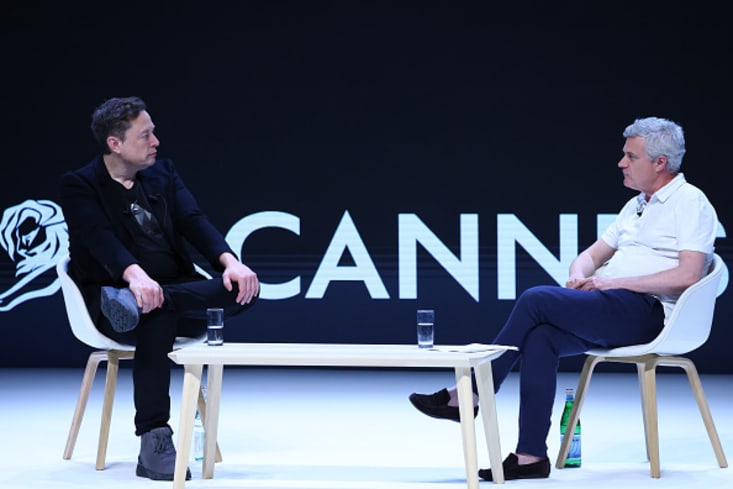We’re past midweek at the Cannes Lions advertising festival, but day three still held plenty of marketing and creativity insights for pharma and healthcare.
This is Day 3 of our series, "The Daily Dose." Read Day 2 here and Day 1 here.
We’re past midweek at the Cannes Lions advertising festival, but day three still held plenty of marketing and creativity insights for pharma and healthcare.
This is Day 3 of our series, "The Daily Dose." Read Day 2 here and Day 1 here.

It’s probably no surprise that artificial intelligence is a hot topic across many of the Cannes stages, and today, tech titan Google weighed in with its take. (Check back tomorrow for Microsoft’s view after its Day 4 presentation.)
The Google execs showed off compelling visuals from Google Labs tests of its Gemini interface, such as four artists reimagination of the book “Alice’s Adventures in Wonderland” that users can choose line by line. And while they are excited about all the AI possibilities, Google Ads product team leader Vidhya Srinivasan added, “Just because the tech is great, it doesn’t mean we can all go about shooting magazine covers. No matter how much AI improves, it is not a marketer. It does not have taste. It does not have ingenuity.”
Unilever chief growth officer Esi Eggleston Bracey echoed the importance of human involvement AI pointing out “everything and nothing is changing in marketing.” She means that the fundamentals of understanding people via deep insights, and creating brands that meet their needs, will continue, even as the rise of AI tools changes how marketers work.
One example is Dove’s “Real Beauty” campaign, now 20 years old. AI is a threat to the real wholesome beauty of women that is fundamental to the brand. So Unilever’s “Keep Beauty Real” campaign aims to shape the AI definition of beauty with realistic images of everyday beauty.
One of the day's most talked about presentations didn’t skimp on the AI either. WPP global CEO Mark Read hosted X platform owner Elon Musk in a packed house – even the overflow room ran out of headphones to listen in. Musk was cautiously optimistic about AI, noting both his estimated “10-20% probability” of an AI-related “terrible” disaster, while reporting the X platform is moving to AI-based ad targeting and also predicting that “AI will amplify creativity.”
Takeaway: AI can be a potential marketing threat with “fake” brands or messages, but we can also use it as a tool to boost creatively, effectiveness and innovation. We think AI plus top creative and data talent equals best-in-class next generation marketing.
Culture and marketing professor Marcus Collins kicked off the TikTok talk with a series of questions for brands: “There’s no force more influential on behavior than culture … But how do we participate in it? How do we engage? What license do our brands have to be a part of it? And with all the evolving technology at our disposal moving faster than ever before, how do we become part of it?”
TikTok global head of business marketing Sofia Hernandez had some ideas. First, she pointed out, most TikTok users want brands on the platform – 79%, in fact. But there’s more to it than starting a brand account.
Another tip? The most successful brands on TikTok are always experimenting and being “creatively brave.”
Takeaway: More pharma companies are using TikTok more in recent years, but it’s time for next steps. As Hernandez said (referring to all brands), “We need to be brave and bold and force our teams to adopt an experimentation mentality. … It should be an OKR (Objectives and Key Results) for every week. What did you do to experiment this week?”
Yes, it is beer, but there are surprising parallels to pharma in its Guinness brand transformation. Much like pharma, Guinness focused mainly on big budget mainstream TV advertising. It hasn’t abandoned TV, but it has moved into social content and working with Guinness brand creators (calling them ‘Guinfluencers’) to tell stories along with them instead of at them.
It’s also an iconic heritage brand with innovation at its core. Callum McCahon, chief strategy officer at Born Social said, “It’s a lot harder to move a heritage brand built on broadcast. It’s almost like a tightrope. On one hand, you’ve got all of the heritage and distinctiveness and DNA built up over the course of a century that you simply cannot afford to lose. On the other hand, you have community and co-creation and user generated content which is fundamental to succeeding in this new environment.”
Takeaway: Guinness is thinking community first with its social media strategy, and pharmas should be thinking similarly patient first for on social media. And how can science heritage and innovation fit into the digital marketing world?
Like any new shiny tech tool, AI gets a lot of hype, but maybe what’s needed is a more realistic view. Unilever’s Eggleston Bracey quoted a favorite social media post that complains AI is going in the wrong direction. “I want AI to do my laundry and dishes, so that I can do art and writing, not for AI to do my art and writing so I can do laundry and dishes.”

